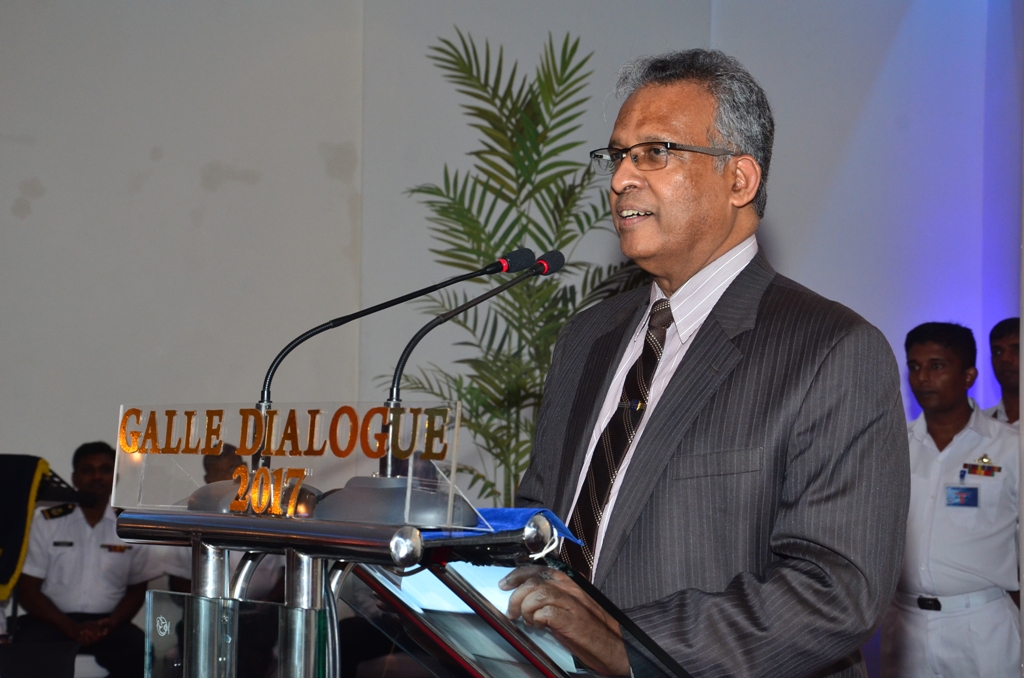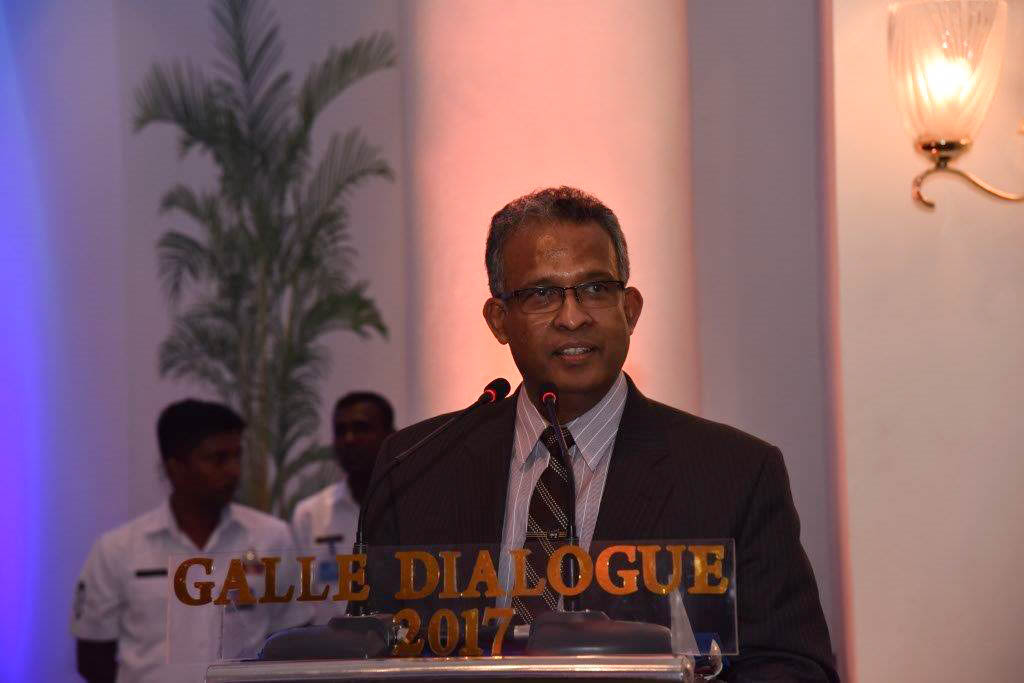

Remarks by
Mr. Prasad Kariyawasam, Foreign Secretary
Importance of the Galle Dialogue International Maritime Conference
and
the Contribution of the Sri Lanka Navy towards Greater Maritime Visibility for Enhanced Maritime Security
At the Official Reception hosted by the Commander of the Navy
on the occasion of the Galle Dialogue 2017
Monday 9 October 2017
Chief of Defence Staff,
Commanders of the Navy, Army and Air Force,
Distinguished delegates and guests,
Excellencies,
Ladies and Gentlemen,
This is the 8th successive year in which the Galle Dialogue Maritime Conference is being held in Sri Lanka, attracting to our Island Nation, personnel from Navies both near and far, and academics and experts in maritime affairs.
I thank and congratulate Vice Admiral Travis Sinniah and his extraordinary team in the Sri Lanka Navy, for organizing this year’s Conference, and for continuing this wonderful tradition that has come to stay. For many, this has now become an annual event to look forward to.
I am personally drawn to this Conference just by its title for two reasons. “Galle” is my hometown. But not just only that. Galle is a city that has played an important role in Sri Lanka’s maritime interactions, in turn influencing the very history of our nation.
For instance,
oOur first contact with the United States probably took place when an American Merchant Ship called at the Galle Harbour somewhere around the same time that the new American Republic adopted its Constitution.
oGalle is said to be the port from which King Solomon reportedly received ivory and peacocks.
oRecorded history tells us that Galle was a prominent sea port through which Persians, Arabs, Greeks, Romans, Malays, Indians and the Chinese were all conducting business with our Island Nation.
oIn 1411, a stone tablet was erected in Galle in three languages – Chinese, Tamil, and Persian – to commemorate the second visit to Sri Lanka by the Chinese admiral Zheng He.
oThe modern history of Galle, which has left a deep impact on our country, is said to have begun with a small fleet of Portuguese ships, being blown off course by a storm, finding their way to Galle. The rest is well-known with an impressive Dutch Fort still standing as a symbol of that part of our history.
The second reason I like the title is for its emphasis on “Dialogue”. Especially being a diplomat, the importance of clear, meaningful, rational dialogue for every conceivable issue in life, and indeed between the Navies of the world, cannot be emphasized enough. There is an ancient saying which all of you must have heard that “Jaw-Jaw is better than War-War”. We in Sri Lanka, having experienced prolonged conflict as a result of separatist terrorism and two youth insurrections, know how true this really is.
We recognize the vital importance of dialogue for prevention of conflict, for the forging of greater understanding, and for the creation and sustenance of peace, stability, and social harmony. And we must all embrace ‘Dialogue’ as the means for decision-making at all levels for the progress and benefit of all our peoples. It is Dialogue that will make us forge better partnerships and more efficient and effective networks against the non-state actors that engage in piracy, drug trafficking, human trafficking and criminal activity in the seas. It is open Dialogue that will make us coordinate and communicate better with the public of our respective nations, creating more awareness about the important work that the Navies do, and address the concept of “maritime blindness”. It is dialogue that will create greater understanding that can lead us towards strategic harmony and convergence.
Ladies and Gentlemen,
In my view, the importance of this annual Maritime Conference lies in its objective of open and transparent dialogue. None are excluded. Everyone is welcome. It is an inclusive forum that provides a platform for Dialogue with the potential for bringing problems and challenges to the table, for discussing ways and means of managing or resolving them, for the betterment of all.
It is extremely encouraging for us to see this forum keep growing, drawing more and more personnel from Navies around the world, government officials, defence and security specialists, strategists, academics, and representatives from International Organisations, the private sector and media.
Ladies and Gentlemen,
The theme of this Conference is ‘Greater Maritime Visibility for Enhanced Maritime Security’.
Sri Lanka, as we all know, is an ‘Island Nation’ that is geographically situated in a significant location in the Indian Ocean, or might I say, the ‘Orient’. Naturally one would therefore expect the people of our country to identify more with the Seas, and have greater awareness about the work and importance of the Navy. But for some reason, I feel that it has not been so.
The Navy, to my mind, has not had its due share of public profile despite the important role it has been playing over the years, including in the combating of terrorism in the country. I also believe that, despite being an Island, there is not enough public awareness about the ‘maritime domain’ itself, and its significance, or the role it plays, or the impact it has, on the day-to-day lives of people in our country.
The Galle Dialogue Maritime Conference has perhaps helped somewhat in creating greater visibility and awareness within the country in recent years, about the importance of the Oceans, the issues involving the maritime domain, and the significance of the Navy; but not enough. We need more informed, meaningful and well researched dialogue, and awareness creation of all aspects of the maritime domain – its significance, and its impact on the day-to-day lives of people, both at present, and with a focus on the future. Especially as a country that is an Island, the Navy, academia, media, and all stakeholders within our country must do more to create awareness within Sri Lanka, amongst our own people – children in schools, youth, university students of all disciplines, civil servants, and the general public – about the ‘maritime domain’ – what is it all about, and the significance of the maritime domain for people both within the country and beyond, the importance of caring for the seas and the maritime environment, the need for its preservation, as well as humankind’s dependence on the oceans.
Ladies and Gentlemen,
The public has this expectation that whatever they want will be available whenever they want it, in the shops, supermarkets, and on their tables. They feel that it is the responsibility of the governments that they elect to ensure that. But most are hardly aware of the processes through which their many wants are met. Not only in the case of Sri Lanka, but in most parts of the world today, people’s needs are met through seaborne means. Those who are aware of this, including the details of the intricate processes by which their needs are met, are very little. This is an acute form of “maritime blindness”. This shows a lack of awareness about economic, security, and strategic issues associated with the international use of the ocean commons. This lacuna must be addressed.
Ladies and Gentlemen,
As the maritime realm becomes increasingly more significant in the context of our nation’s development, I think it is vital that the Navy gets more involved in task of implementing our Nation’s renewed and progressive vision for itself as a reconciled, peaceful, stable, and prosperous nation.
In this context, it is necessary for the Navy to define itself as being embedded deeper in the identity of our Nation as a key institution that is of vital service to the Sri Lankan nation and all its people.
It is also necessary that the public considers the Navy as an integral part of our Nation’s core identity. It must be considered as an Institution that is of service not only to the people of Sri Lanka, but to the world beyond; a force for good, carrying Sri Lanka’s flag in collaborative missions in the region and beyond, out there in the high seas – making sea lanes safer for shipping, for the free flow of goods, participating in humanitarian, evacuation and disaster relief operations, and contributing to regional and global security.
This, Ladies and Gentlemen, is also a projection of our Nation’s values. What modern post-conflict Sri Lanka stands for:
-a peaceful Indian Ocean that is inclusive;
-a rules-based order, following international norms and practices;
-freedom of navigation and overflight;
-safe sea lanes that allow for the free flow of goods, both for us and our partner nations; and
-peaceful rules based settlement of disputes.
The Navy must view itself, and the Nation must consider the Navy, as an extension of Sri Lanka’s diplomacy of peace and goodwill.
Ladies and Gentlemen,
Indeed, greater maritime visibility is essential for enhanced maritime security. Networking and working in partnership with other Navies and other institutions and organisations that are operating in the maritime domain – both governmental and non-governmental – is necessary in this endeavour.
Let me highlight some issues that require attention in the maritime domain around us, for better maritime management and security:
oProtection of the Marine Environment and Control of Maritime Pollution
oManaging the problem of IUU fishing, and protection and observation of fishing regulations
oProtection of EEZs and managing and protecting resources
oCombating drug trafficking, human trafficking, and arms smuggling
oCombating Piracy
oEnsuring energy security by safeguarding the energy supply chains that are vulnerable to disruption at maritime choke points such as the Straits of Malacca, Bab Al-Mandab, the Suez Canal, the Turkish Straits and the Strait of Hormuz
oManaging Port Security and ensuring secure cargo loading
oEnsuring safety of the seas for tourism
oDealing with maritime terrorism
oEnsuring that the almost 90 percent of the world’s goods that are transported via sea have safe and secure passage
oEnsuring that the tremendous volume of electronic financial transactions, e-mails, and phone calls that are transmitted through oceanic submarine cables is safe
Working in partnership, and sharing of knowledge, information, skills, expertise, and best practices, is essential, as no single entity, or no single Navy or Country can succeed in meeting these challenges in the maritime domain on its own.
Ladies and Gentlemen,
Let me conclude with an important thought.
It is the Oceans that engendered life. The life of humans and all beings on our Planet, is dependent on the good health of our Seas. Our ancestors, perhaps, were conscious that if we don’t take care of the Ocean around us, that will lead to the eventual end of life as we know it, on the land that we occupy. Yet, this knowledge has slipped us by, as we walked the path of what we call ‘progress’. It is only now that we are once again gradually getting back in touch with ancient wisdom. The Sea belongs to all, and we belong to the Sea. It is our resource of last resort. Therefore, the public must be made more aware of our efforts in the maritime domain and we must involve all stakeholders and the public in all our efforts relating to the maritime domain.
It is important for the world’s Navies and maritime experts to develop and implement effective programmes to educate citizens about the importance of the oceans as marine super-highways, and the roles and missions of their Navies, Coast Guards, and other related institutions and organisations in protecting the interests of their people and their nations, on the ocean commons and in littoral waters.
I wish you all the best in your deliberations.
Thank you.




